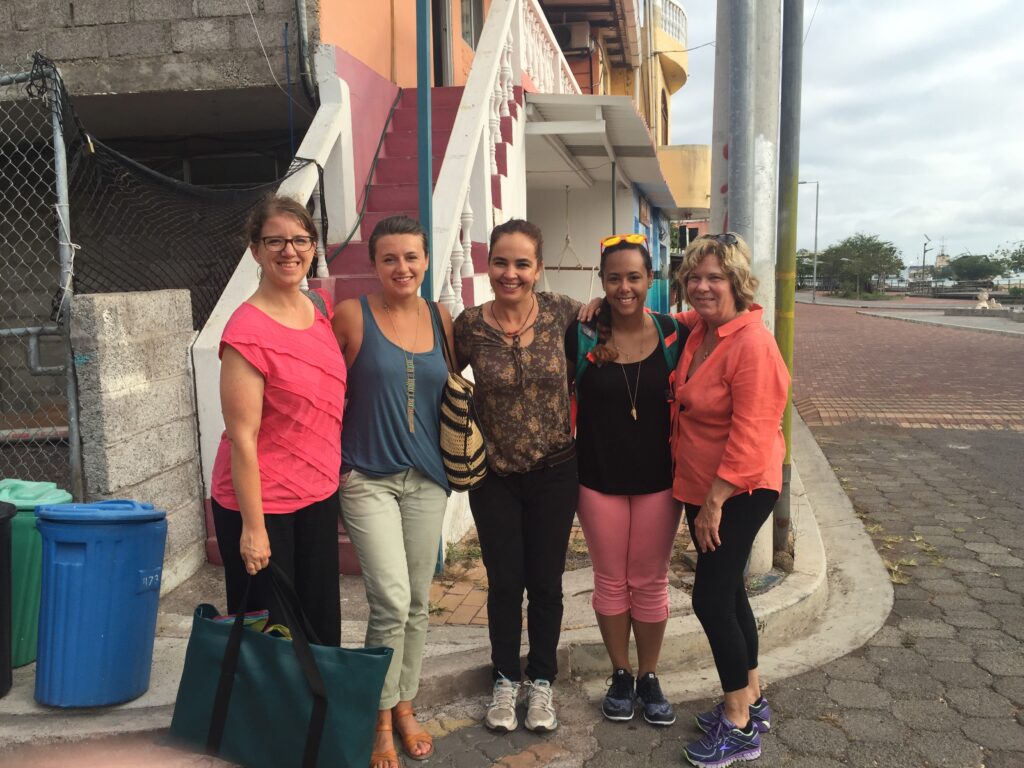International Womenʼs Day is an opportunity to celebrate the social, professional, and cultural achievements of women all over the world. The Galapagos Initiative is home to incredible female leaders and scientists at UNC, USFQ, and at the Galapagos Science Center. For International Womenʼs Day this year, we will showcase seven of these accomplished women throughout the week.
Today we sit down with Amanda Thompson, biological anthropologist and UNC professor in the College of Arts and Sciences and Gilling School of Global Public Health.
Can you share a bit about your research?
I have always been really interested in child growth and the effects of childhood factors on long term health. This can include biological factors like diet, or social ones, like gender norms and household environment. I study how all these factors during early life can shape health across the life course.

In the Galapagos, I study different birth practices and infant health. I listen to womenʼs concerns about their access to enough quality food and water. There is a lab component where we measure markers of immune function and take microbiome samples, but there is also qualitative research where we are allowed into homes to talk to families about their lived experiences. We have a unique opportunity to ask questions that may be considered sensitive because we have built relationships with the community.
What has been your experience as a female researcher?
Sometimes, anthropology is considered a “fuzzy” science, but it is so important to understand. I have run into the opinion that maternal and child health is a lesser science because you are dealing with womenʼs issues. Health and person-based research can be especially downplayed and even belittled at times as some may not perceive it as “hard science.”
Having women in research really opens up the types of projects being done, especially in wanting to understand maternal and child health. As a woman, it is often easier for me to be invited into households to speak with family members. In the Galapagos, we tend to get the majority of our data from mothers and their children which is partly due to the nature of work in the Galapagos – where men work away from the home. Women do not tend to identify as head of the household but, in reality, they many times are running it.
How has the Galapagos Initiative benefitted from having women in key leadership roles?

Having women in key leadership roles has been extremely helpful in opening the range of research that people are doing and also showing women that science is a career option for them. For example, my colleague Diana Pazmiño is a great example of someone born and raised in Galapagos who can serve as a model for the community and show that there are roles for women in science.
The Galapagos Science Center (GSC) is a good model of different career paths that women can take. There are women doing research and succeeding in project management and leadership roles. We need voices in science that are diverse in race, ethnicity, gender, and geographic location. The more diverse scientists we have, the more we are going to learn.
What has been your experience working in the Galapagos?
Since the Galapagos islands are 600 miles out to sea, you have to think about anything that could go wrong ahead of time. Being organized and flexible is required! Internet connectivity is a challenge and supplies can be difficult to get, but the people make it so easy. The community makes it worth it.
I first came to the Galapagos with my graduate student, Kelly Houck, and I stayed because of the support of the people who want to do this work and build up the human health side of the research. The network of connections is fantastic. We work with UNC and USFQ researchers, but also with the hospital and the local community. The families know and trust us. The working environment makes it very easy and rewarding to do work on the islands.
Written collaboratively by Kelly Weaver, Director of External Affairs & Communications, Center for Galapagos Studies; and Molly Herring ’23, UNC Global Studies and Biology.

